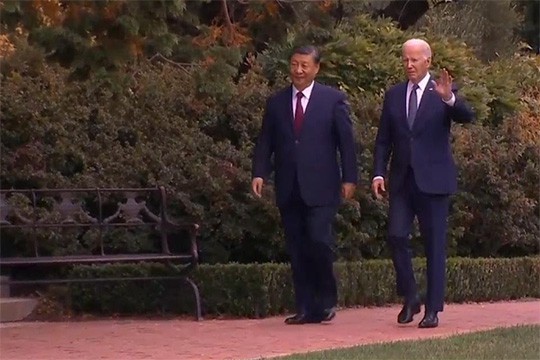The Biden-Xi summit sends a signal to Russia too. Russia’s relations with the US are at an impasse, but China, while joining hands with Russia to counter US hegemony, is also seeking engagement with the US. In the China-Russia-US triangle, China is giving itself more flexible diplomatic options, notes Kanwal Sibal, a former Indian Foreign Secretary, India’s Ambassador to Turkey, Egypt, France and Russia.
The Joe Biden-Xi Jinping meeting in San Francisco on the occasion of the APEC summit did not signify any meaningful breakthrough in their increasingly adversarial relationship. To alter the dynamics behind the deterioration of their ties, a redefinition of their interests and policies is needed. This is not on the cards.
The US sees China as a rival, the only real one that can counter US global power, politically, economically and technologically. If the Chinese political and economic system was compatible with that of the West and China was seen as willing to become a part of the West-dominated global system without challenging it as it became more powerful itself, its rise would not have been considered threatening the way it is today. In fact, this was the US expectation when China was admitted to the WTO, the West made massive investments in China and gave access to its advanced technology.
At his meeting with Xi, Biden, according to the White House readout, registered the various US concerns about China and was unapologetic about the steps taken to redress the balance in America’s favour. He made it clear that the two countries were in competition but that the US would want to manage this competition responsibly in order to prevent conflict and avoid confrontation. This nuances the earlier enunciation of US policy towards China which laid out that the US will compete, cooperate, and where necessary, confront China.
Biden made it plain that the US will invest in sources of strength at home and align with allies and partners. Not that China is not aware of this, but the point in emphasising this was to draw limits to the engagement that the US seeks with China. With this in view, Biden reaffirmed support for a free and open Indo-Pacific, peace and stability in the South China Sea and the East China Sea, and freedom of navigation and overflight. He underlined America’s iron-clad commitment to defending its allies, which was a signal also to its allies that this US overture towards China would not be at the cost of its commitment to its allies. On the very sensitive issue of Taiwan, he warned against any unilateral change of status quo in Taiwan and called for Chinese restraint.
The US seems to have in mind the Cold War model of its engagement with the Soviet Union on military matters while making the resumption of high-level military-to-military cooperation with China virtually the central goal of the Biden-Xi summit. The US and the Soviet Union despite being adversaries wanted nonetheless to agree to some confidence-building measures, avoid the danger of a direct conflict, besides preventing an unbridled arms race. These were the guardrails that the US put in place with the Soviet Union, and a version of these the US wants to establish with China.
The US has succeeded in restoring the high-level military-to-military cooperation with China, which the latter cancelled in August 2022. This is the kind of guardrail the US wanted to avoid tensions escalating into an actual military conflict. The US-China Defence Policy Coordination talks, the Maritime Consultation Agreement meeting, and telephone communication between theatre commanders will be resumed. The aim is the management of conflict, not the elimination of conflict. Xi has warned though that military communication between the two countries would be on the basis of equality and mutual respect. This caveat suggests that China can walk away again if it sees US actions in the region as unacceptably provocative, such as the US continuing to arm Taiwan.
The fundamental question Xi asked in San Francisco was whether the US and China were rivals or partners. Xi knows the answer but still chose to ask it rhetorically. A top-level meeting as part of diplomatic management does not overcome fundamental differences. Biden and Xi have met before, but US-China relations have continued to deteriorate. Putin and Biden, for instance, met in Geneva in June 2021 but we see how any hope that ties would improve has been totally belied...
read more in our Telegram-channel https://t.me/The_International_Affairs

 10:42 25.11.2023 •
10:42 25.11.2023 •























